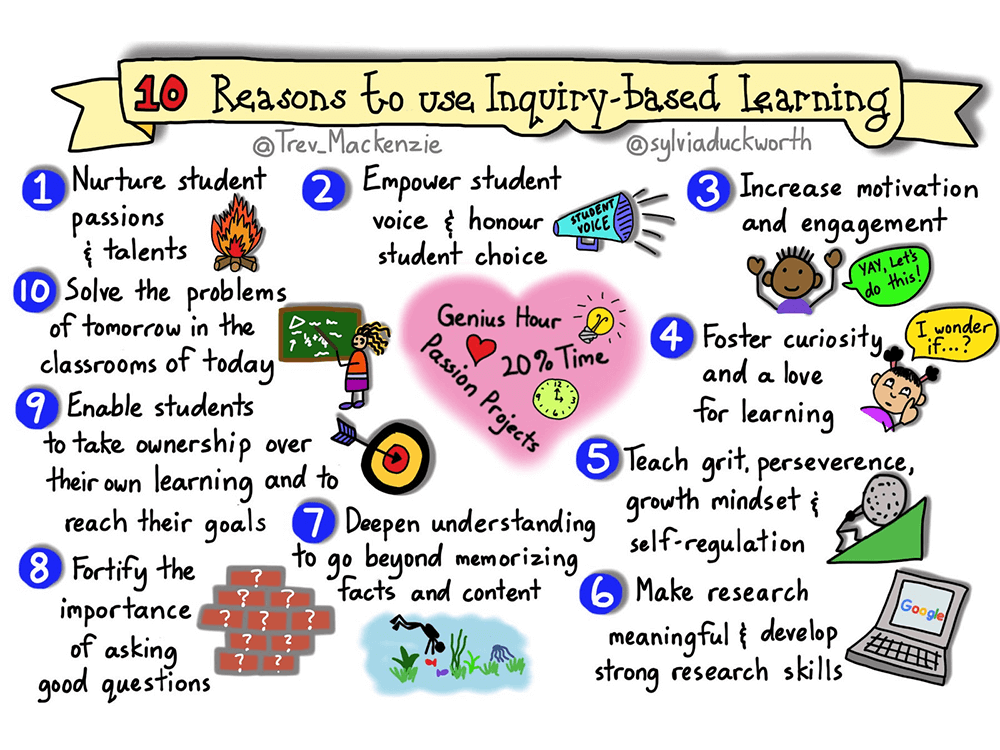Inquiry–Based Learning
Throughout my B.Ed, I have learned a lot about inquiry-based learning, and the many benefits that come with it. From my teaching and learning experience, I am definitely a supporter for this learning approach. I truly believe that this form of learning allows the students to be in-charge of their own learning, which leads them to thinking independently. Inquiry-based learning teaches many valuable skills that will help anyone throughout their entire life.
Below I have attached a video that I’ve found that shares a good understanding of inquiry-based learning.
To summarize that video, inquiry-based learning is an approach that emphasizes the students role in their own learning. It is about activating the student’s curiosity (Wolpert-Gawron, 2021). Inquiry learning uses learning approaches such as small group discussions, guided learning, case studies, research projects, field work, and many more. What differs from these learning approaches compared to quizzes and tests is that instead of memorizing specific facts, the students are learning from doing. Giving a student the opportunity to explore a topic more deeply and learn from their own experiences make this type of learning very effective.
There are many benefits to inquiry-based learning. I have found this image by Trev Mackenzie and Slyvia Duckworth that show us 10 benefits to this type of learning. I have attached this directly below.

Personally, as a teacher in British Columbia, it is extremely important that I am understand inquiry-based learning because it it very prominent in BC’s Curriculum. For example, for Mathematics in grade 4, students should be able to “Develop, demonstrate, and apply mathematical understanding through play, inquiry, and problem solving” (Curriculum | Building Student Success – B.C. Curriculum, 2021). Another example of this is in English Language Arts grade 6, students should be able to “Apply appropriate strategies to comprehend written, oral, and visual texts, guide inquiry, and extend thinking” (Curriculum | Building Student Success – B.C. Curriculum, 2021). As shown by our curriculum, inquiry-based learning is present in todays schooling system. Recently, in my university experience there have been times where I have completed inquiry-based projects. I found these extremely valuable because I was in-charge of my own learning and it held me accountable. An example I can think of is in my third year of university, we did a social studies project on a topic of our choice and it was entirely self led. I was able to guide myself through a topic that interested me, and this was one of my most memorable learning experiences in university; and it came from inquiry-based approach!
To conclude, I think inquiry-based learning does align with my groups chosen topic. In our Blueprint we discuss how one way we want to teach this topic is through “inquiry”, so it does directly relate. In our topic we state that, “The students will have an opportunity to research a community of their choice. They must find the Indigenous background of this community. Next, they will have to share why they chose this community and the meaning of it to them. They then will have to demonstrate how they could provide care to the chosen community and how they built a relationship with the land.” This is a good example of how inquiry-based learning is supported in our chosen topic.
Connections:
I enjoyed reading my pod member Kate’s blog post for this section. In her post she discussed the learning approach, Open Pedagogies. In her post, she shared two very informational videos. Personally, these videos truly helped be understand this concept further and engage in the material. Additionally, while reading her post, I noticed a similarity between inquiry-based learning and open pedagogies. In her post, she states, that “Open pedagogy as engaging students in the creation and development of knowledge rather than having them mainly receive or reiterate information.” This relates to inquiry-based learning because with both these types of approaches it is focused on the learner, what they find interesting and not about memorizing and reiterating information. I believe both inquiry-based learning and open pedagogies go hand in hand, and if used together, could create a successful and efficient learning environment, for both the students and the teacher.
Link to Kate’s blog post: https://katemcgowan.opened.ca/2021/10/16/blog-post-2-teaching-and-learning-approaches/
References:
Curriculum | Building Student Success – B.C. Curriculum. (2021). Retrieved 18 October 2021, from https://curriculum.gov.bc.ca
Wolpert-Gawron, H. (2021). What the Heck Is Inquiry-Based Learning?. Retrieved 18 October 2021, from https://www.edutopia.org/blog/what-heck-inquiry-based-learning-heather-wolpert-gawron

Hi Kayla!
Great blog post this week! Definitely agree that pedagogies is an excellent experiential learning approach. It allows students to be actively involved with the material. Studies have shown that individuals retain 75% of what we do, compared to 10% of what we read. Being hands on in the classroom is very beneficial and I definitely think students should be given more opportunities to do so. Thank you for teaching me more characteristics of pedagogies. I enjoyed reading your blog!
LikeLike